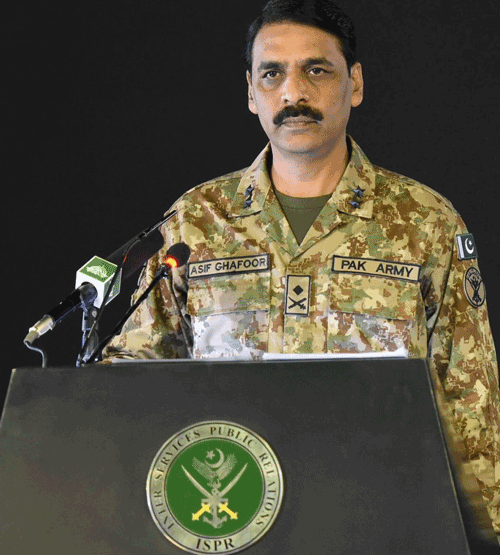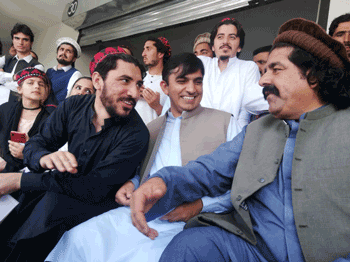The Empire Strikes Back
By Rahimullah Yusufzai | Newsbeat National | Published 6 years ago
The Pakistan military recently warned the Pashtun Tahaffuz Movement (PTM) leadership that its time was up as it had exhausted the liberties granted to it despite pursuing an anti-state agenda. Rather defiantly, the PTM legislator Mohsin Dawar reminded the DG ISPR, Major General Asif Ghafoor, that their time was not up, but had just started.

DG ISPR announces at a press conference that the PTM will no longer be tolerated.
This exchange of harsh statements showed the animosity that has been building up between the two sides and has now reached a breaking point. From the tone of Major General Ghafoor’s statement, it was evident that the military had decided that the PTM could no longer be allowed to operate publicly – as it has been doing, by organising political activities and consistently criticising state institutions, particularly the army. He warned the PTM to stop using derogatory terms against the military, as it could be dealt with easily because nobody could face the power of the state.
Major General Ghafoor made serious allegations against the PTM at a press conference, where he also announced plans for spearheading madrassa reforms and warned India that any misadventure against Pakistan would invite retaliation like the one on February 27, when two Indian warplanes were shot down and a pilot was captured.
The military spokesperson alleged that the PTM is being funded by the Indian intelligence agency, Research and Analysis Wing (RAW) and Afghanistan’s National Directorate of Security (NDS). Mentioning specific dates and venues, he said Pakistan’s security agencies had collected evidence about payments made to the PTM by RAW and NDS. Posing a set of questions to the PTM, he sought answers about its sources of funding. He argued that the information given on the PTM website didn’t provide the details about the money it had received. He hinted at providing evidence about the payments made to PTM by hostile intelligence agencies once it replied to the questions posed to it.
As was to be expected, the PTM leaders rejected the allegations and offered to present their accounts for scrutiny. Angry with the Pakistani media for denying coverage to the PTM under pressure from the authorities, its founder Manzoor Ahmad Pashteen went to the extent of accusing the local media of supporting terrorism.
Mohsin Dawar and Ali Wazir, the two PTM-affiliated members of the National Assembly, said they were ready to appear before the Parliament to answer allegations of foreign funding. The former claimed the PTM had been accused of receiving foreign funding as it steadfastly demanded the accountability of those involved in the extrajudicial and targeted killing of innocent people. He added that the PTM also made demands for the recovery of the missing people.
The military, or the elected government of Prime Minister Imran Khan, hasn’t made public the action being contemplated against the PTM. Major General Ghafoor’s message, however, was loud and clear: the PTM will not be allowed to function as it had allegedly received funding from RAW and NDS to destabilise Pakistan. He added that action against the PTM would be taken in accordance with the law and Pashtuns being incited by it would not be harmed.
Some of the possible next steps could involve approaching the court of law for outlawing the PTM, banning its activities, as well as arresting and putting its leaders on trial. Police cases filed against PTM activists earlier, could be activated and new ones registered to paralyse their activities and get them convicted by the courts. Such a course could take time depending on the workings of the courts.
The government would have to figure out how to deal with PTM leaders Mohsin Dawar (top left) and Ali Wazir, who were elected as MNAs from North Waziristan and South Waziristan, respectively, in 2018. As the PTM isn’t registered with the ECP, the two contested the general election as independents. This could cause complications, as they aren’t formally representing the PTM.

PTM leaders Manzoor Pashteen (L), Mohsin Dawar (centre) and Ali Wazir at a public meeting in Miramshah, North Waziristan. (Photo courtesy Ihtesham Afghan/Twitter).
It is true that the victory of Dawar and Wazir against strong candidates of the Pakistan Tehreek-e-Insaf (PTI) and Jamiat Ulema-i-Islam-Fazal (JUI-F) showed the PTM’s considerable electoral support in the two Waziristans. However, three other candidates affiliated with the PTM and contesting from other parts of the erstwhile Federally Administered Tribal Areas (Fata) faced defeat, showing the limitations of its electoral base.
The presence of Dawar and Wazir in the Parliament has enabled the PTM to highlight its grievances and seek support from other political parties for its causes. In fact, it is believed that the PTM could back candidates in the tribal districts in the forthcoming election for the 21 seats of the Khyber Pakhtunkhwa (KP) Assembly and become a player in provincial politics. It remains to be seen if the PTM-backed candidates would be able to contest the polls in the wake of the charge-sheet made against it by the military.
The Pakistan People’s Party (PPP) took the lead in offering its support to the PTM for some of its causes. The party’s young head, Bilawal Bhutto-Zardari, met a PTM delegation and was vocal in expressing views that obviously will not go down well with the military and the ruling Pakistan Tehreek-e-Insaf (PTI). The PPP leadership was upset with the fact that Major General Ghafoor pointed out former president, Asif Ali Zardari’s links with senior police officer, Rao Anwar, who has been accused of ordering the extrajudicial killing of Naqeebullah Mehsud, the young man originally from South Waziristan who lost his life in Karachi in a fake police encounter. It was ironic that the reason for the PTM’s rise in January 2018 was its decision to seek justice for Naqeebullah Mehsud’s family and its first major demand was the arrest and punishment of the accused, Rao Anwar, who supposedly has close links with the PPP leadership.
The other four demands of the PTM include clearing landmines and unexploded ordnance that were posing a threat to civilians and people who have returned home after years of displacement; removing roadside security checkpoints where locals face humiliation at the hands of security personnel; the recovery of thousands of people who went missing during the war against terrorism; and the setting up of a truth and reconciliation commission.
While the government and the military claim that some steps have been taken to resolve these issues, the PTM is not satisfied. Instead, it has raised new issues after drawing support from Pashtuns outside the ex-Fata region and gaining the sympathy of progressive and liberal forces in the country. Efforts made by the military and the KP government, to engage with the PTM in a dialogue to resolve the issues, have not made any progress. It has to be seen if another attempt would be made to talk to the PTM after it has been declared an anti-state entity.
According to Major General Ghafoor, 48 de-mining teams deployed in the conflict-hit areas have cleared 45 per cent of the tribal districts of landmines and reduced the number of security checkpoints. He said the government’s Commission of Inquiry on Enforced Disappearances was working on the 2,181 pending cases while another 3,659 cases were disposed of, after most of the missing persons were found in internment centres.

Delegation led by Mohsin Dawar (third left) meets PPP Chairman (second left) and Farhatullah Babar (first left) at Parliament House. (Photo courtesy: Farhatullah Babar/Twitter)
As receiving money from foreign intelligence agencies amounted to treason, the military has concluded that the PTM has crossed the so-called ‘red line’ that was to be avoided as per the warnings of the army high command in the past. The military, in particular, was livid when the PTM raised slogans and used threatening language against it in its public meetings and blamed it for the suffering of the Pashtun people. At times, the PTM acted irresponsibly and irrationally, as it could have highlighted its genuine demands in a better way, instead of provoking the state institutions and ruining its own chances.
In view of the unannounced ban imposed on coverage of the PTM’s activities in the Pakistani media, the group has made wide use of social media to spread its message. The international media has given the PTM unusually high coverage and sympathised with its cause. Further curbs could be enforced on the PTM, whose leaders are already facing police cases and have been stopped from travelling abroad.
The PTM claims that it speaks for the rights of the ethnic Pashtuns, who suffered as a consequence of both militancy and military operations in the former tribal areas and other parts of the Pashtun-populated region for over a decade. Its argument is that military-managed state policies fuelled militancy and created security issues that continue to cause suffering among the Pashtuns. While the government claims that the policies of the past are being rolled back and that the tribal areas are being mainstreamed and provided with Rs 100 billion annually over a period of 10 years, the effort will undoubtedly take time due to security and capacity issues.
The PTM could circumvent the likely ban on it by emerging with a new name – a practice followed by many Pakistani political parties and extremist groups. There is also the growing understanding in the country that branding a group or an individual as a traitor, by filing treason cases, will not resolve or bring the issue to an end. The PTM has been peaceful until now, but there is growing concern that curbs on its activities could cause resentment among its members and lead to a hardening of positions. The government will have to work hard and do a lot more to address the grievances of civilians who suffered displacement and human and material losses if the goal is to weaken the PTM’s appeal.
Rahimullah Yusufzai is a Peshawar-based senior journalist who covers events in the NWFP, FATA, Balochistan and Afghanistan. His work appears in the Pakistani and international media. He has also contributed chapters to books on the region.


